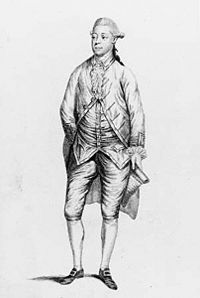
George Ogle
Encyclopedia

Ireland
Ireland is an island to the northwest of continental Europe. It is the third-largest island in Europe and the twentieth-largest island on Earth...
Tory
Tory
Toryism is a traditionalist and conservative political philosophy which grew out of the Cavalier faction in the Wars of the Three Kingdoms. It is a prominent ideology in the politics of the United Kingdom, but also features in parts of The Commonwealth, particularly in Canada...
politician.
Ogle was a member of the Privy Council of Ireland
Privy Council of Ireland
The Privy Council of Ireland was an institution of the Kingdom of Ireland until 31 December 1800 and of the United Kingdom of Great Britain and Ireland 1801-1922...
from 17 October 1783. He represented Wexford County
Wexford County (Parliament of Ireland constituency)
Wexford County was a constituency represented in the Irish House of Commons to 1800.-1692–1801:...
in the Irish House of Commons
Irish House of Commons
The Irish House of Commons was the lower house of the Parliament of Ireland, that existed from 1297 until 1800. The upper house was the House of Lords...
from 1769 to 1797, when he refused to stand again. The Hobart's Relief Bill of 1793 had allowed Catholics who owned free-holdings of at least 40 shillings of annual rental value to vote and Ogle was staunchly against Catholic Emancipation. In 1798, Ogle returned to parliament, where he represented Dublin City
Dublin City (Parliament of Ireland constituency)
Dublin City was a constituency represented in the Irish House of Commons to 1801.-History:In the Patriot Parliament of 1689 summoned by King James II, Dublin City was represented with two members. In the 1760s the radical politician Charles Lucas used the seat as his political base.-1689–1801:...
until the Act of Union in 1801.
In the following Parliament of the United Kingdom
Parliament of the United Kingdom
The Parliament of the United Kingdom of Great Britain and Northern Ireland is the supreme legislative body in the United Kingdom, British Crown dependencies and British overseas territories, located in London...
he retained his seat for Dublin City
Dublin City (UK Parliament constituency)
Dublin City was an Irish Borough constituency in the House of Commons of the United Kingdom of Great Britain and Ireland. It comprised the city of Dublin in the county of Dublin, and was represented by two Members of Parliament from its creation in 1801 until 1885.In 1885, Dublin City was split...
and sat as Member of Parliament
Member of Parliament
A Member of Parliament is a representative of the voters to a :parliament. In many countries with bicameral parliaments, the term applies specifically to members of the lower house, as upper houses often have a different title, such as senate, and thus also have different titles for its members,...
without a fresh election. In the general election of 1802
United Kingdom general election, 1802
The United Kingdom general election, 1802 was the election to the 2nd Parliament of the United Kingdom. It was the first to be held after the formation of the United Kingdom of Great Britain and Ireland...
Ogle lost his seat to Whig
British Whig Party
The Whigs were a party in the Parliament of England, Parliament of Great Britain, and Parliament of the United Kingdom, who contested power with the rival Tories from the 1680s to the 1850s. The Whigs' origin lay in constitutional monarchism and opposition to absolute rule...
candidate John La Touche
John La Touche (politician)
John La Touche was an Irish Whig politician.La Touche represented Newtownards in the Irish House of Commons from 1796 to 1798, Newcastle in 1798, and Harristown from 1797 until the Act of Union in 1801. Subsequently La Touche became a Member of Parliament in the new Parliament of the United...
.

